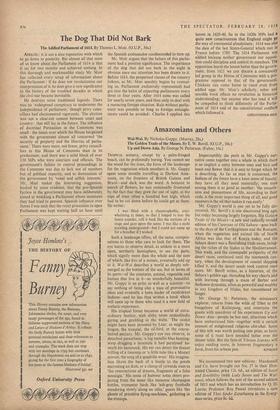The Dog That Did Not Bark
The Addled Parliament of 1614. By Thomas L. Moir. (0.U.P., 30s.)
ADDLED: it is not a nice reputation with which to go down to posterity. But almost all that most of us know about the Parliament of 1614 is that it sat for two months and achieved nothing. In this thorough and workmanlike study Mr. Moir has collected every scrap of information about the Parliament : if he does not revolutionise our interpretation of it, he does give it new significance in the history of the troubled decades in which the civil war became inevitable.
He destroys some traditional legends. There was no 'widespread conspiracy to undermine the independence of parliament,' though privy coun- cillors had electioneered vigorously. The election was not a clear-cut contest between court and country : that still lay in the future. The influence of doctrinal Puritanism in the Commons was small : the issues over which the House bargained with the government almost all concerned 'the security of property and the liberties of parlia- ment.' There were more, not fewer, privy council- lors in this House of Commons than in its predecessor, and there was a solid block of over 150 MPs who were courtiers and officials. The government's failure to control proceedings in the Commons was due to lack not of numbers but of political capacity, and to domination of the government by 'venal and selfish interests.' Mr. Moir makes the interesting suggestion, backed by some evidence, that the pro-Spanish faction in the government may have deliberately aimed at wrecking a ParliaMent whose summons they had tried to prevent. Spanish influence over James I was such that the royal procession to open Parliament was kept waiting half an hour until the Spanish ambassador condescended to turn up.
Mr. Moir argues that the failure of this parlia- ment had a positive significance. The importance of the dog that did not bark ' in the night is obvious once our attention has been drawn to it. Before 1614, the propertied classes of the country (whom, as Mr. Moir sensibly begins by remind- ing us, Parliament exclusively represented) had got into the habit of expecting parliaments every three or four years. After 1614 none was called for nearly seven years, and then only to deal with a menacing foreign situation. Rule without parlia- ment was possible so long as foreign entangle- ments could be avoided : Charles I applied this lesson in 1629-40. So in the 1620s MPs had s quite new consciousness that England might go the way of continental absolutisms : 1614 was also the date of the last States-General which met 10 France before 1789. The 1614 Parliament was addled because neither government nor opposi- tion could discipline and control its members. The opposition learnt the lesson better than the govern- ment; from 1621 we can discern a consciously led group in the House of Commons with a pro- gramme opposed to that of the government. Chickens can come home to roost even from addled eggs. Mr. Moir's scholarly, sober and sensible book effects no revolution in historical understanding; but anyone who has read it will be compelled to think differently of the Parlia- ment of 1614 and of the constitutional conflicts which followed it.
CHRISTOPHER HILL


































 Previous page
Previous page